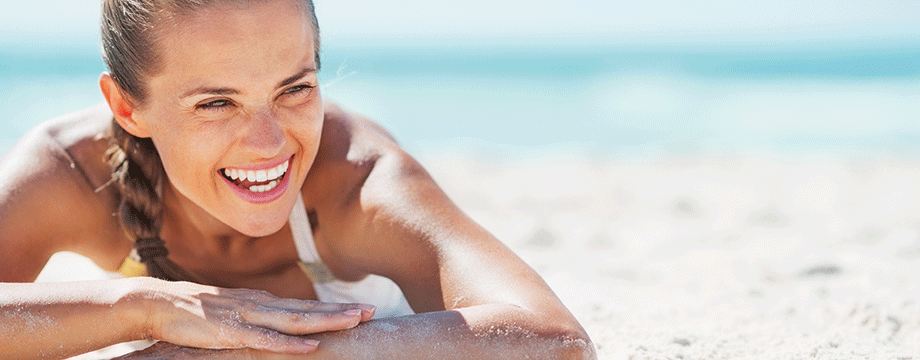Summer solutions

Positively glow with health and enjoy the summer now that it is here – with these top tips for sailing through the usual seasonal health challenges
THE SUN AND VITAMIN D
“If you are lucky enough to get some sun this summer you have a great opportunity to top up your vitamin D, provided you don’t slather yourself with sunscreen every minute you are out,” says Nancy Flexman of Eats of Eden in Limerick.
About half of people in Ireland are deficient in vitamin D and many of us now fear any exposure to the sun, but our bodies need vitamin D. The rule of thumb when it comes to sun exposure is: If you are taller than your shadow then the sun is high enough for you to make vitamin D. In Ireland this is in the middle of the day. In more southern locations the window of opportunity is wider. Expose as much skin as possible without sunscreen for 20 minutes or so.
“We are meant to get vitamin D from the sun, so avoid the sun paranoia we have been encouraged to have,” says Nancy Flexman, “but don’t get burnt. Think of sunlight as an essential nutrient. Water is also an essential nutrient, but you can drown in it. It is usually recommended that you apply sunscreen before going into the sun.”
CHOOSING A SUNSCREEN
“Unlike most other areas within cosmetics, the issue is not so much how natural or synthetic a UV filter is, but rather how effective it is at protecting against UV radiation, and whether it has any adverse or unwanted side-effects,” says Ian Taylor, cosmetic scientist at Green People. “For instance, some UV filters such as oxybenzone which is a very effective filter against both UVB and UVA, but has also been linked to photo-allergic contact dermatitis, and some reports suggest that it may be an endocrine-disruptor.”
“When buying sunscreen, avoid the ones that contain questionable ingredients such as parabens, retinyl palmitate and oxybenzone,” says Nancy Flexman. “Your independent health store should be able to help.”
HOLIDAY FIRST AID
When you are travelling to foreign climes, or even going to your local beach it’s a good idea to go prepared with a first aid kit.
“I would recommend arnica tablets and ointment for bruises, shocks and sprains,” says Nancy Flexman. “Calendula ointment is good for cuts and scrapes. Pack lavender oil for its calming, pain-relieving, anti-inflammatory and other properties.”
A BUG’S LIFE
Mosquitos, midges and other insects can make summer pretty miserable for some people who end up with sore, itchy red weals, so what can you do? “Insect repellents are some of the most toxic chemicals that are designed to be applied to your skin,” says Nancy Flexman. “One trick is to take high doses of vitamin B1, also known as thiamine (300-500mg a day) before and during your holiday. Apparently it makes you invisible to mosquitoes. Avoid highly scented personal care products. Many essential oils are insect repellents too, including citronella, cinnamon leaf, geranium and lavender. A number of non-toxic insect repellents are also available.”
HELP FROM FRIENDLY BACTERIA
“When travelling abroad, a number of environmental changes can affect gut balance, potentially resulting in traveller’s diarrhoea,” says Adrienne Benjamin, a nutritionist at ProVen Probiotics. “As well as stress, lack of sleep, dehydration and altitude changes from flying, these changes might include eating local food, increased alcohol intake and exposure to local water as well as a different and unfamiliar range of local bugs.
“Most experts agree that to provide maximum benefit, it is useful to start taking friendly bacteria prior to a trip abroad and to continue taking them after returning home,” says Adrienne Benjamin. “We recommend taking them a week prior to and for one to two weeks upon returning home.”
RUDE HEALTH TIPS:
If you are going somewhere sunny pack a large hat and loose thin clothing that covers your shoulders.
Beta carotene – can help to prepare the skin for the sun. It increases a pigment in the skin called melanin which gives the skin a tanned appearance.
Aloe Vera gel – remedy for sunburn. It cools the burn and repairs damaged skin.
Water and lavender oil – mix in a spray bottle for sunburn.
Astaxanthin – for prickly heat. If you are prone to this condition take astaxanthin before exposing your skin to the sun.
Ginger – good for travel sickness and nausea. Try a tea or capsules.
Water – drink plenty of water throughout the day to prevent dehydration and avoid drinks which can dehydrate you such as coffee, tea and alcohol.
Coconut water – for dehydration. Full of natural electrolytes.
Electrolyte sachets –mix with cooled boiled water to replace salts lost from the body through diarrhoea.
Garlic – changes the odour given off from the body through the sweat glands, helping to repel insects. Odourless tablets are popular.
Neem and citronella oils – natural insect repellents, try a skin-friendly spray. Citronella can also be burnt in candles and oil burners.
Lavender essential oil – apply undiluted to bites to take away the sting and the itch.
Pack a high-strength, research-backed bacteria supplement that is small and easy to pack, does not require refrigeration or spoil easily. If you are visiting a tropical location, store away from intense heat in a cool dry place.
More Rude Looks articles here...
Articles from our latest issue...